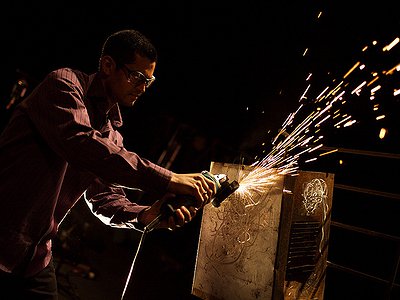What constitutes a good live performance in your opinion? What’s your approach to performing on stage?
My job is to bring my best possible performance. However, my playing is only one aspect of the concert experience. I think that a good live performance is when both the performer and audience are engaging in a full way. When it happens just right the experience is truly magical.
The effect of a piece doesn't merely depend on the performance of the musicians, but also on the place it is performed at. How do you see the relationship between location and sound? In how far do you feel the current system of concert halls is still the right one for contemporary music in general?
I agree that the setting has a great impact on our perception of the music. Concert halls are absolutely a wonderful place to listen to new music. That being said, increasingly, artists are being very creative on reimagining the concert setting. This should be encouraged and developed further.
As Charles Rosen put, “the death of classical music is perhaps its oldest continuing tradition”. From your perspective, what are some of the root issues for what is generally referred to as the “crisis of classical music”, which also includes the scene for contemporary composition, and what, to you, are sensible ideas for improving it?
I had never heard that quote, but I suppose I agree with him. Put simply, I think that there are always two sides to art. One side is constantly pushing for innovation and the other for preservation. The problem with the traditional approach to classical music is that it is inherently a preservationist culture. But the dichotomy absolutely needs to always exist. Without the preservationist culture the tradition would die. But without innovation the artform will be permanently banished to the museum.
Music-sharing sites and -blogs as well as a flood of releases and concerts in general are presenting both listeners and artists with challenging questions. What's your view on the value of music today? In what way does the abundance of music change our perception of it?
I think it is a wonderful time to be a musician. We are all exposed to a wider array of music and this is spawning some really amazing creativity. That being said, the model of the music industry itself is changing very rapidly. But while the major labels have struggled, we have seen some amazing innovation and creativity at the grass roots level. It still remains to be seen how this shift will pan out.
Many artists are finding it hard to secure a living with their music. What are the financial realities you're living with and in which way, do you feel, could they be improved?
This is the age old struggle for any artist. However, we now live in the age of the artist entrepreneur. Rather than following a traditional career path, increasingly musicians are taking greater control of the business side of their careers and creating their own opportunities.
Reaching audiences usually involves reaching out to the press and possibly working with a PR company. What's your perspective on the promo system? In which way do music journalism and PR companies change the way music is perceived by the public?
It has a major influence. Artists are increasingly turning more to PR companies over traditional managers. The model is changing.
Usually, it is considered that it is the job of the artist to win over an audience. But listening is also an active, rather than just a passive process. How do you see the role of the listener in the musical communication process?
The listener is a major part of the process. Without an audience I am just a cellist playing in a room for myself. Music is inherently an interactive art form. When a concert takes place, everyone in the room is engaged in the process.
Please recommend two artists to our readers which you feel deserve their attention.
First on my list would by my wife, composer Paola Prestini. In addition to being a great composer with commissions and performances at the Barbican Center, the Brooklyn Academy of Music and the Krannert Center to name a few, she perfectly embodies the notion of the artist entrepreneur. She is the Founding Director of the VisionIntoArt, an interdisciplinary company based in New York and is currently the Creative Director of OMW (Original Music Workshop), an amazing new venue that is slated to open up in Williamsburg, Brooklyn next year.
Next I would say Jon Rose. No label can be used to describe this genius. He is constantly experimenting and innovating. Perhaps the greatest force for creativity I have ever met.
To read and hear more Jeffrey Zeigler, visit www.jzcello.com



